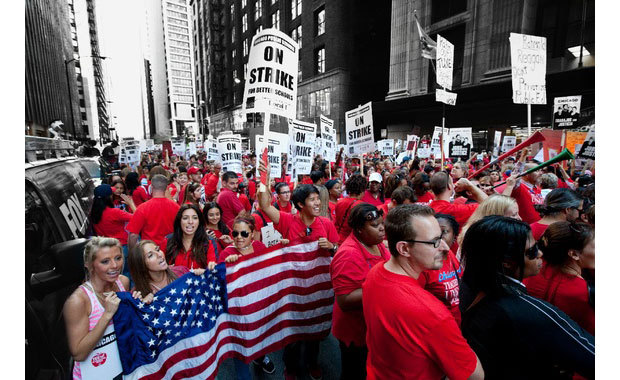The End of Public-Employee Unions?

The Supreme Court has been asked to take a case that could deal a crippling blow to the labor movement.
By Garrett Epps
Constitutional scholars sometimes like to commend courts for what they call “the passive virtues”—a reluctance to become involved in constitutional dispute, a reticence to announce new rules, a preference for standing by earlier decisions (“stare decisis”).
Judges, too, like to cite what they call “the canon of constitutional avoidance,” a set of rules designed to avoid unnecessary constitutional decisions. In Federalist 78, Alexander Hamilton promised that the new union’s courts would have “have neither force nor will, but merely judgment.”
The truth is that since at least Marbury v. Madison, Courts and Justices have hinted, signaled, begged, and reached out to litigants to bring them issues where one or more justice thinks the law needs to change. On the current Court, few of the Justices have signaled quite as vigorously as Justice Samuel Alito. Alito, a man of firm likes and dislikes, has twice questioned the constitutionality of public-employee contracts. Neither case, however, presented the chance to invalidate them.
Now his moment may have come. In response to Alito’s hints, the issue has landed squarely in the Court’s inbox in the form of a petition for review in a suit against the California Teachers Association. If Alito gets his desired result, it will deal a long-lasting blow to union power—and, perhaps by coincidence, the Democratic Party.
Here’s the issue: Even in union states, public employees cannot be required to join a union. Such a requirement, the Court has said, would violate their First Amendment rights, because that would be the government requiring them to speak and associate against their will. However, state governments can sign agreements with unions designating the union as the official bargaining agent for all employees, members or not. The union then must represent both members and non-members—and representation costs money, in the form of lawyers, economists, researchers, and so forth. Non-members are thus potentially “free riders” who get a service paid for by their fellow workers.
In response, a compromise developed called the “agency-fee” or “fair-share” payment. Requiring objectors to pay for political activities or lobbying would be “compelled political speech,” and violate the First Amendment. However, under the “fair share” system, non-members are charged a fee that excludes these political activities and is designated to cover only the chargeable costs of actual representation—negotiating contracts, administering benefit programs, and helping employees with grievances.
The “fair share” fee is Alito’s current target. In a 1977 case called Abood v. Detroit Board of Education, the Burger Court said the fees do not violate the First Amendment: “Public employees are not basically different from private employees,” the Court said. “[O]n the whole, they have the same sort of skills, the same needs, and seek the same advantages.” The subjects of collective bargaining are the same in either case. Wages and working conditions in the public sector have a political quality, but in their essence were more like the issues that private employers and their workers must negotiate. A state could decide that “exclusive representation” would make for a more orderly workplace; it could also decide to disallow “free riders.” Neither decision violated the First Amendment. “A public employee who believes that a union representing him is urging a course that is unwise as a matter of public policy is not barred from expressing his viewpoint,” the Court said. “Besides voting in accordance with his convictions, every public employee is largely free to express his views, in public or private orally or in writing.”
Abood has become the basis for scores of public-employee contracts, and the Court has reaffirmed it at least four times over the past 30 years. But in 2011, a group of service workers in California challenged a union “special assessment” designed to fund an emergency campaign against certain anti-union measures proposed by then-Governor Arnold Schwarzenegger. The case was decided within the Abood framework; but in his majority opinion, Alito signaled his dislike of the entire line of cases. “[F]ree-rider arguments … are generally insufficient to overcome First Amendment objections,” he wrote. Agency fee agreements thus represent a First Amendment “anomaly—one that we have found to be justified by the interest in furthering ‘labor peace.’ But it is an anomaly nevertheless.”
Anti-union groups hastened to explore this possible opening, and in the 2014 case of Harris v. Quinn, the Court faced a new challenge to “fair-share” payments by a group of home-health workers funded by a federal-state program. Though the workers were hired and supervised by the clients whose homes they worked in, the Illinois legislature voted to allow them to vote for a bargaining agent, and they chose the Service Employees International Union. Plaintiffs objected to the fees, and asked the Court to overturn Abood once and for all. In the end, however, the majority chose not to overturn Abood; instead, it reasoned that the home-health care workers were not “full-fledged” state employees, and thus the state had no need for “labor peace,” as it might at a school or a government office.
[Source]: The Atlantic


